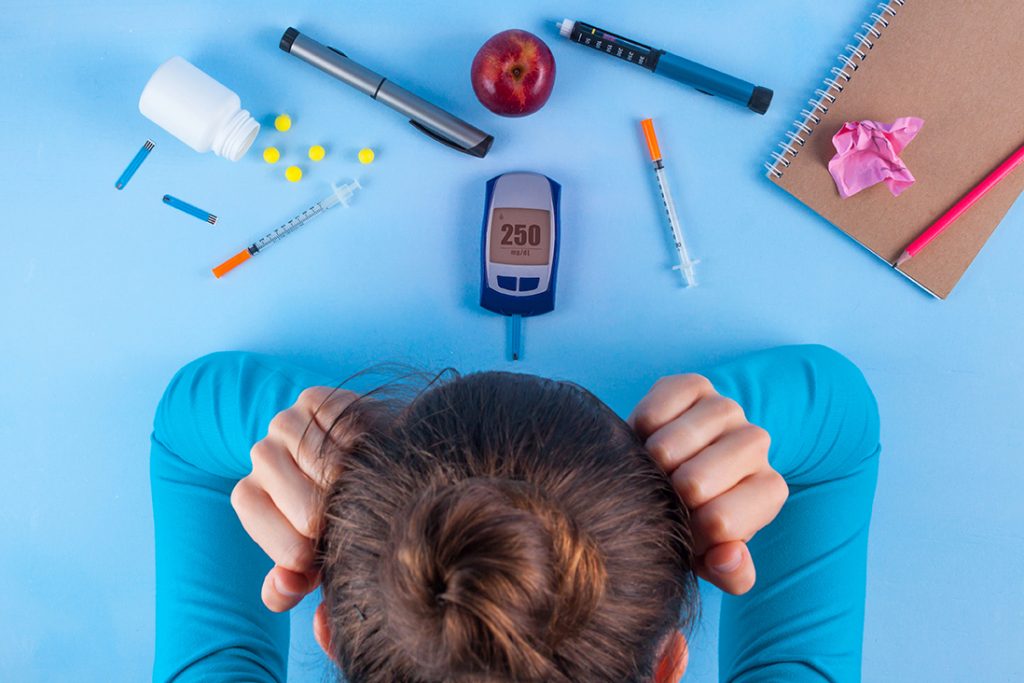How Stress and Mental Health Directly Impact Your Blood Sugar
The hidden connection between your mind and glucose levels that nobody talks about—plus proven strategies to break the cycle
Key Takeaways
- Stress can raise blood glucose by 20-30 mg/dL within just 20-30 minutes through cortisol and adrenaline release
- Sleep deprivation drops insulin sensitivity by 25-40% after just one night of poor sleep
- Depression increases HbA1c by 0.18% on average, even when people take their medications
- Mindfulness-based stress reduction can lower HbA1c by 0.25-0.30% in just 8 weeks
- Diabetes distress predicts blood sugar control better than general depression symptoms

The Shocking Truth About Stress and Your Blood Sugar
Here's something most doctors don't tell you upfront: your emotions can spike your blood glucose faster than a candy bar. I've been working with diabetics for over 15 years, and I've seen people's readings jump from 120 to 180 mg/dL during a heated phone call with their insurance company. It's not magic—it's biology.
When you're stressed, your body doesn't care if it's a saber-tooth tiger or your boss giving you grief. The response is identical: your adrenal glands dump cortisol and adrenaline into your bloodstream. These stress hormones tell your liver to start cranking out glucose "for energy," while simultaneously making your muscle cells resistant to insulin. It's like having both the gas pedal and brakes pressed at once.
The research backs this up completely. Studies show that acute psychological stress can raise glucose levels by 20-30 mg/dL within 20-30 minutes in most adults. That's significant enough to push someone from normal into prediabetic range, or from well-controlled diabetes into concerning territory.
What makes this particularly tricky is that many people don't realize their stress response is triggering these spikes. They blame their diet for blood sugar control issues when the real culprit might be their emotional state. Understanding this connection is the first step toward better glucose management.
Stop Stress From Sabotaging Your Blood Sugar
While you're learning to manage stress, give your body the nutritional support it needs to maintain healthy glucose levels naturally
Stress Response Support
Helps your body better handle cortisol's impact on glucose
Better Sleep Quality
Natural ingredients that promote restorative sleep
Balanced Glucose
Supports healthy blood sugar levels throughout the day
Limited Time: Free shipping + 3 bonus health guides included
How Sleep Loss Wreaks Havoc on Your Glucose Control
Sleep isn't just rest—it's when your body resets its metabolic systems. When you consistently get less than 6 hours per night, you're essentially giving yourself temporary diabetes. I know that sounds dramatic, but the research is crystal clear on this point.
After just one night of sleeping 4 hours or less, your insulin sensitivity drops by 25-40%. Your body literally forgets how to process glucose efficiently. The cortisol stays elevated, your sympathetic nervous system remains on high alert, and whole-body insulin resistance sets in. I've had patients whose morning readings were perfect for months, then suddenly spiked after a few nights of poor sleep.
Short sleepers (those getting less than 6 hours nightly) are twice as likely to develop insulin resistance compared to people who get 7-9 hours. This isn't just correlation—controlled studies where researchers deliberately restricted participants' sleep show measurable hepatic and peripheral insulin resistance developing rapidly.
The good news? This damage reverses quickly. Studies show that extending sleep beyond six hours can restore insulin sensitivity in people who've been chronically sleep-deprived. Consistent bedtimes and wake times seem to be particularly important for maintaining stable glucose patterns throughout the day.

Anxiety's Direct Line to Your Blood Sugar
Anxiety doesn't just make you feel terrible—it actively sabotages your glucose control in ways that most people never connect. Cross-sectional studies involving adults with type 2 diabetes consistently show a moderate positive correlation (around r≈0.45) between anxiety scores and HbA1c levels. That means the more anxious you are, the worse your long-term blood sugar control tends to be.
The mechanism is pretty straightforward once you understand it. When anxiety hits, your body releases catecholamines—the same fight-or-flight chemicals involved in acute stress. These hormones do two things that mess with your glucose: they decrease insulin secretion from your pancreas and they impair insulin disposal in your tissues.
Laboratory studies confirm this isn't just theoretical. Researchers can literally induce anxiety in study participants and watch their glucose handling deteriorate in real-time. The effect is measurable and consistent across different populations.
What's particularly frustrating is that many people get caught in anxiety loops about their blood sugar readings. They see a high number, which causes anxiety, which raises their glucose further. Breaking this cycle often requires addressing both the physical and psychological aspects simultaneously through targeted exercises to manage blood sugar and stress-reduction techniques.
Depression: The Silent Blood Sugar Saboteur
Depression affects blood sugar control in ways that go far beyond just "not taking care of yourself." A massive meta-analysis looking at 68,398 participants across 34 different studies found that people with depression had HbA1c levels that were 0.18% higher compared to non-depressed individuals—and this was true even when people were taking their glucose-lowering medications as prescribed.
That might not sound like much, but 0.18% represents a meaningful difference in long-term complications risk. More importantly, it shows that depression has direct biological effects on glucose metabolism that persist regardless of medication adherence or self-care behaviors.
From a physiological standpoint, depression involves chronic elevation of stress hormones, inflammatory cytokines like IL-6 and TNF-α, and disrupted circadian rhythms. All of these contribute to progressive insulin resistance and higher fasting glucose levels. It's like having a slow-burning fire of inflammation that constantly interferes with normal glucose processing.
I've noticed in my clinical experience that people with depression often describe feeling "disconnected" from their diabetes management. They know what they should do, but they can't seem to motivate themselves to do it consistently. This isn't laziness or lack of willpower—it's a neurochemical condition that affects both mood regulation and metabolic function. Treating the depression often leads to spontaneous improvements in glucose control, even without major changes to diabetes medications.

Diabetes Distress: When Disease-Specific Worry Drives Poor Control
"Diabetes distress" is different from general depression or anxiety—it's the specific worry, burnout, and intrusive fear related to diabetes complications and management. And here's what's really interesting: diabetes distress predicts glucose control more strongly than general depression symptoms do.
Studies with teens who have type 1 diabetes show that diabetes-specific distress—not depressive symptoms—explained the variance in HbA1c levels even after adjusting for how often they checked their blood sugar. Similar patterns show up in adult clinics: only 4% of people with high diabetes distress meet both HbA1c targets and retain proper hypoglycemia awareness.
What makes diabetes distress particularly destructive is that it creates a vicious cycle. People worry about complications, which leads to avoidance behaviors (like not checking blood sugar when they suspect it's high), which leads to worse control, which validates their fears and increases the distress.
I've found that addressing diabetes distress requires very specific interventions. General mental health support helps, but people need diabetes-specific coping strategies. They need to learn how to manage the emotional burden of constant medical decisions, how to handle the fear of complications without it paralyzing them, and how to maintain hope while being realistic about their condition. Sometimes this is more important than fine-tuning their medication regimen.
The Vicious Cycle: How High Glucose Worsens Mental Health
Here's where things get particularly cruel: high glucose levels don't just result from poor mental health—they actively make mental health worse, creating a self-reinforcing downward spiral that can be really hard to break.
When blood glucose runs high, it triggers fatigue, irritability, and increased inflammation throughout the body, including the brain. This inflammatory response affects neurotransmitter function and mood regulation. People describe feeling "foggy," emotionally flat, or inexplicably angry when their sugars are elevated.
The fatigue is particularly problematic because it makes all the self-care behaviors that help with diabetes management feel impossible. You know you should go for a walk or prepare a healthy meal, but you literally don't have the energy. Then you feel guilty about not taking care of yourself, which adds to the stress and depression.
Breaking this cycle often requires what I call "metabolic mood stabilization"—getting glucose levels stable enough that people have the mental energy to engage in psychological interventions. Sometimes that means adjusting medications or adding targeted supplements before diving into therapy or stress management techniques. You can't build psychological resilience when your brain is constantly dealing with glucose fluctuations.
Evidence-Based Psychological Interventions That Actually Work
The good news is that we have solid research on psychological interventions that improve both mental health and glucose control simultaneously. These aren't just feel-good approaches—they produce measurable changes in HbA1c levels.
| Intervention | Duration | HbA1c Effect | Mental Health Benefit |
|---|---|---|---|
| Mindfulness-Based Stress Reduction (MBSR) | 8 weeks | -0.25% to -0.30% | Large reductions in anxiety & stress |
| CBT/Motivational Interviewing | 6-12 sessions | -0.13% average | Reduced diabetes distress |
| Mind-body exercise (Tai Chi, yoga) | 24 weeks | -0.3% to -0.7% | Lower depression/anxiety |
| Brief relaxation/hypnotherapy | 1-4 sessions | -10-20 mg/dL immediate | Rapid anxiety reduction |
What's particularly impressive is that mindfulness-based interventions produce HbA1c reductions comparable to adding a second diabetes medication. Eight weeks of daily mindfulness practice can lower HbA1c by 0.25-0.30%, which is clinically significant.
The key insight is that interventions work best when they simultaneously lower physiological stress (measurable through cortisol levels) and teach practical coping skills. Mind-body approaches like Tai Chi and yoga are particularly effective because they combine physical movement, breath regulation, and mental focus in ways that directly counter the stress response.
Practical Daily Strategies You Can Start Today
Knowing the science is one thing—applying it in real life is another. Here are the most practical strategies I've found that people can actually stick with long-term, based on what works in clinical practice:
Track Your Patterns
Log glucose alongside mood, sleep quality, caffeine intake, and stressful events. Most people are surprised by the patterns they discover. Use a simple rating scale (1-10) for stress and mood—you don't need anything fancy.
Schedule Micro-Destressing
Two-minute diaphragmatic breathing sessions or short walks can blunt cortisol spikes and prevent post-meeting glucose surges. The key is doing them preemptively, not just when you're already overwhelmed.
Adopt a Daily Mindfulness Habit
Ten minutes of guided practice daily for eight weeks produces measurable HbA1c and blood pressure benefits. Apps like Headspace or Calm work fine—consistency matters more than the specific technique.
Sleep hygiene is non-negotiable. Consistent bedtimes restore insulin sensitivity more effectively than most people realize. If you can only change one thing, make it your sleep schedule—7-9 hours nightly with regular timing.
Movement-based mind-body practices like Tai Chi, yoga, or even brisk walks in green spaces can lower both fasting glucose and anxiety in as little as one week. The combination of gentle physical activity and mental focus seems to be particularly powerful for breaking stress-glucose cycles.